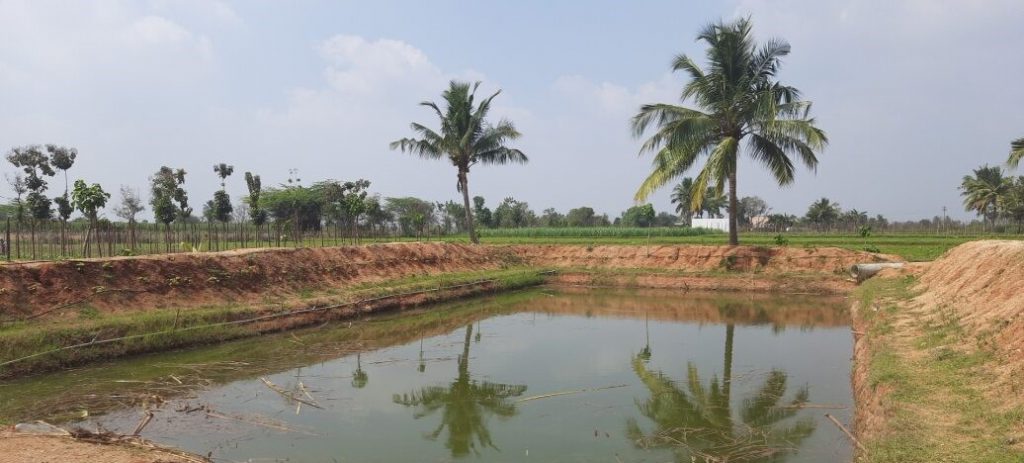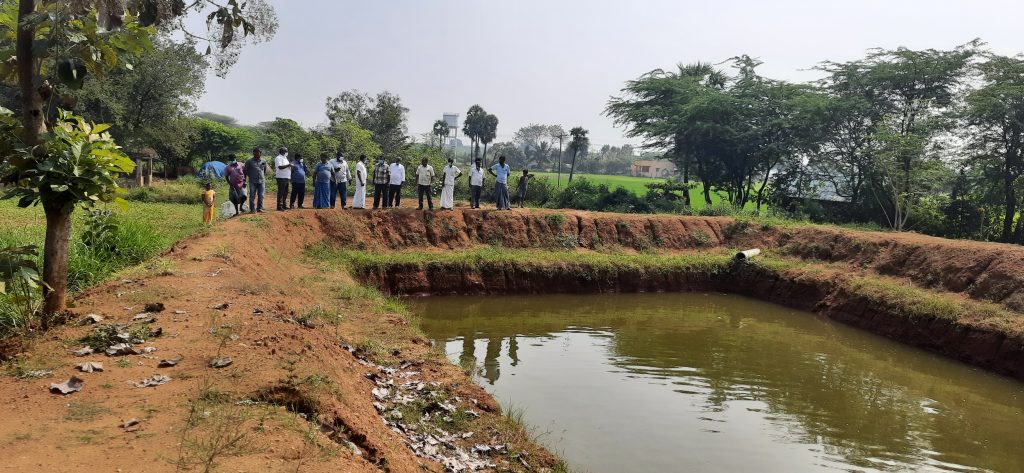Positive benefits of 1121 farm ponds in Tiruvannamalai District, Tamil Nadu
Like many other regions, Tiruvannamalai District in Tamil Nadu has always grappled with water scarcity challenges for years. Irregular rainfall and declining groundwater levels pose a significant risk to agriculture, livelihoods, and overall water security. The urgent concern was addressed through an initiative of constructing 1121 farm ponds across the district within a month (August 19 to September 18, 2021). The ponds were strategically designed to capture and retain surface rainwater runoff, thereby providing life-saving irrigation for crops and improving groundwater replenishment.
The blog examines the impacts of farm ponds over the last three years and how they revolutionised the Tiruvannamalai’s water landscape.
The farm pond initiative
Farm ponds being cost-effective and sustainable solutions, presented a ray of hope to tackle the region’s water problems. It was a multi-stakeholder collaborative effort involving the local government, communities, and a developmental research organisation under the Mahatma Gandhi National Rural Employment Scheme. The surface runoff from rainfall is collected and stored for irrigation when there is water scarcity for crops at its critical stages. At the same time, it gradually percolates into the soil, supporting the recharge of groundwater aquifers.

Encouraging results
Over the last three years, the groundwater recharge result from1121 farm ponds has been highly encouraging. Groundwater levels in the vicinity of these farm ponds have witnessed a steady improvement. A positive change is the increasing groundwater level from 10 to 4 mbgl (meters below ground level) in the pre-monsoon period and from 2.98 to 1.94 mbgl during the post-monsoon period. Also, there was a decline in the over-exploited blocks from 37 to 13 firkhas over the last two years, along with various water conservation activities that are carried out under the Water Security and Climate Adaptation Project (WASCA) with the collaboration of the local government and the state government of Tamil Nadu.
The improved groundwater recharge has led to improved water availability for irrigation during dry periods, ensuring a continuous water supply for crops. Farmers in Tiruvannamalai reported increased crop yields and reduced dependency on monsoon rainfall for cultivation. The farm ponds served as a lifeline for agriculture with a positive effect on the resilience of farming communities.
Beyond agricultural gains, the farm ponds also contribute to restoring the ecological balance in the region. Increased groundwater levels helped rejuvenate the wetlands, streams, and vegetation, thus promoting biodiversity conservation. The ponds have also become new habitats for various aquatic species.
Challenges still exist
While the results of the farm pond initiative have been commendable, it is crucial to address challenges to ensure long-term success. Proper maintenance of farm ponds, including regular desilting and upkeep, are essential to maximize water storage capacity. Community involvement and awareness programmes can play a pivotal role in sustaining such efforts. By actively engaging local communities in the maintenance and management of farm ponds, a sense of ownership and responsibility can be fostered.

These small but mighty structures have significantly contributed to groundwater recharge improvement, benefiting agriculture, livelihoods, and the environment. By capturing and conserving rainwater, the farm ponds have become vital assets in the fight against water scarcity and climate change risks on agriculture. As we move forward, continuous monitoring, community involvement, and further integration with water management strategies are key to ensuring a sustainable and water-secure future for Tiruvannamalai. The farm pond initiative serves as a beacon of hope, inspiring similar efforts to create resilient and water-secure communities.
Sources:
http://www.groundwatertnpwd.org.in/avwl_status.htm
http://cgwb.gov.in/GW-Assessment/GWR-2022-Reports%20State/Tamil%20Nadu.pdf
https://cgwb.gov.in/GW-Assessment/GWRA-2017-National-Compilation.pdf

